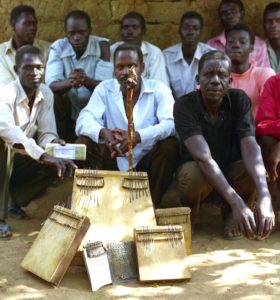
The above title gives just three of the names used in Uganda for that class of musical instrument known as Lamellaphones. Search for lamellaphones on Facebook if you wish to see a variety of instruments from elsewhere in Africa. In Uganda they have been popular throughout northern Uganda having probably travelled there in the hands of singers and porters from further west in central Africa. They are also played in much of eastern Uganda. As in the picture above Ugandan instruments are usually box-resonated and carry a variety of lamellae and tuning arangements. The lamellae are often fashioned from bicycle and motor-cycle spokes, hammered flat and shaped wider at the plucked end.
Lango district
In both Lango and Acholi I met and recorded lively, well-practised groups of youths in 1968 and more later when I revisited northern and eastern Uganda in 1997.during the 1990s relative peace was returning again in Lango after the downfall of Idi Amin and the routing of John Kony’s rebels.
Kong Ilato okeme group
This group recorded the following song for me. Entitled ‘Prayers’ it is usually the first song played by many groups whether for rehearsals or for performances. The group lived in and around Akangi Ogur, 9 miles from Lira town on the Apala road.
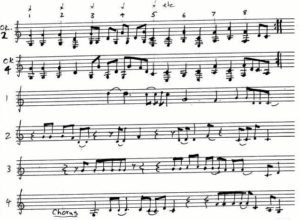
The first two music lines give the opening phrases played on two different okemes: they are followed by the opening lines of the singer. His text begins as follows:-
Man kampong me Agoci. Kamponi âme okwongo ni Kong Ilato
This is a band from Agoci. A band which is called Kong Ilato
Ame gin otye iyi Ogur iyi Akangi Dong wer gi nama acel bino cakere kede lego
Who are at Ogur in Akangi. Presently their first song starts with a prayer
Kome eno bino (eno)
Here comes the body of the song…..
[instrumental opening]
Ee, atin acel yia yom ayoma Ee, miya bunu tam iyi Uganda
Ee, as an only child I am happy. Ee, share with me your thoughts on Uganda
Ee, atin acel yia yom ayoma Wuleg wunu Obanga
Ee, as an only child I am happy. Seek the blessing of God
Obanga okony wan. Acwec okony wa iyi Ugana
Help us God. Bless us in Uganda, Creator
Uleg wunu acwec. Uleg wunu Obanga
Pray to the Creator Pray to God
Obanga okony wan iyi Afrika. Obed wunu mot
God help us in Africa. Let us be peace loving
obed wunu acwec . Obanga okong wa Afrika…… etc.
Let us be, Creator . Bless us in Africa……. etc.
Julius Ekukha
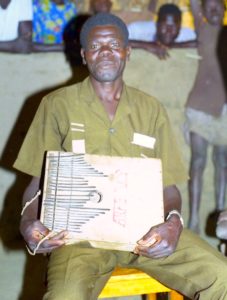
The okeme is also favoured by older singer-poets to accompany their often solo performances that comment on social conditions and behaviour, as well as give advice on such matters as health. One of the best known and respected of such poet-bards was Julius Ekukha. He can already be heard on Facebook singing the song Cilim advising about Slim – a Ugandan nickname for the Aids virus , which was afflicting the whole of northern Uganda in the 1990s.
Here with his song Dongo Lobo (Developing Uganda) he warns listeners against having any thoughts on continuing resistance to the central government and advises them to work more to develop their region.
People, we need to stay low, that’s the only way the country can develelop.
People, we need to stay low, that’s the only way our home can develop.
We, the Langi ourselves,
We the Langi are the ones who caused for ourselves the problem.
We want to enter into intrigues whose details we know nothing about, people.
What have we done?
We should see only ways of developing our country.
Let us not enter into intrigues whose details we know nothing about.
We people, the Lango . It will spoil our peace and cause us to live in sorrow.
If we want to develop our country we must leave jealousy.
Jealousy will not develop the country at all.
If we want to develop our country we must love education.
It’s education that will develop our country.
People , let me now tell you what develops the country, folks:
People we should stay calm , that is what develops homes, please!
Some people say they want the Movement, others say no to it.
Some others say they want to develop the country so they give us iron sheets.
Other people say that we in particular who receive iron sheets
will some day run our Movement when it falls.
We answer that we want all people. You can also go and bring us yours.
We will nail the iron sheets up and no-one will remove them.
[Kindly transcribed and translated by Dr Okaka Opio Dokotum.]
My musical transcription begins with the basic okeme line followed by the opening utterances. Pitches are approximate.
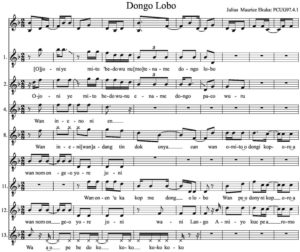
South Eastern Uganda
Districts like Busoga, lying just to the east of the Nile where it begins its journey north from Lake Victoria, are populated by mainly Bantu speakers whose name for lamellaphones make use of the ndongo root – hence endongo and budongo which links them to harps and lyres which have similar resonant sounds.
In this region bands of mainly lamellaphone players are rarer than mixed ensembles. A lead singer frequently plays a small budongo with possibly one or two others budongo players.but such teams may additionally contain one or more flutes, a fiddle or two, rattle, drums and often a xylophone (embaire).
Biansi Mata, was a renowned blind singer in southern Busoga.
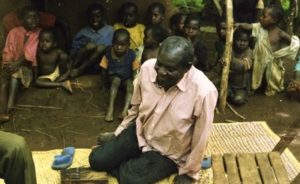
Here too are his team’s instruments, while they take beer together from a large calabash via long straws.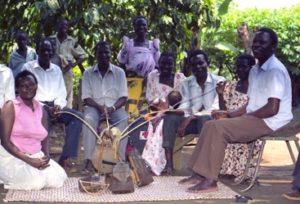
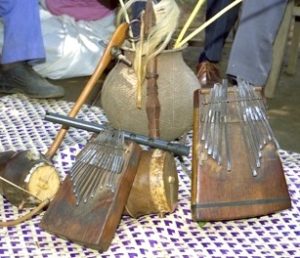
Otabona bukaire. Is one of Mata’s best known songs. I’ve shortened it for he begins with just his endongo accompanying his singing and it is several minutes before the two fiddles join in followed by a flutist near the very end. You can hear the compete performance on the CD Ouganda: Ensembles villageois du Busoga – Uganda: Village Ensembles of Busoga or search BL Sounds for Mata
Oh, yeiwe! Oh, yenze! ndibulala
Oh you! Ah me! I am restless
Yeiwe twalibamukwano
Oh you, we were friends
Otabona kukairigha – ah!
Despite my old age
Era bwendighano mpoomera ebuko
As I am here, I can look good among my in-laws
Otabana bukaire nanvu
Though I seem old and grey-haired
Era bwendighano nsanira ebuko
As you see me, I am presentable at my in-laws’ place
Otabona kukairigha
Though I seem old
Ghemumpa omughala oyo muna, Waire nzira nte
Could you please give me that girl, friend, even if I have a cow (as a bride-price).
Omwoyo, Maama okunyhanaghala
My spirit, Maama is numb
Mpwine bwire okwembera abataka
I’ve risen early to sing for the clan elders
Endongo edhiziraku abaghala, tidhi sangaala.
Endongos played in the absence of girls are not pleasant to listen to
Mpwine bwire okwembera abataka balelwa
I’ve risen early to sing for the clan elders, friends
Aghali osimye, tighabula ogeya
Where there are those who appreciate, others despise.
Ghemumpa omughala oyo, muna waire nzira nte
Could you please give me that girl, friend, even if I don’t have a cow?
Yeiwe, Eh! Lughaire! nina owange alimala – ah!
Dear you! Eh! Lughaire [his endongo], I have mine who will satisfy me
Ghulira bwekemye eghaya bakoirome yeiwe, elikuwaya
Hear the way it is booming, my in-laws, it’s talking
Ndhete Namukobe Eisoma,
Let me call Namukobe of the Eisoma clan [his wife]
Oh! Tibata olimwoyo
Oh! Tibata, you are my spirit!
Mpwine bwire okwembera abataka
I’ve risen early to sing for the clan elders
Obughafu maadhi tigakuba mulala balelwa
Sorrow is [like] rain – it does not affect only one person
Ghoduuba ebingi oseenena omwoyo
When you brood over so many matters your soul wastes
Eriyo abaghala abaasoma
There are some girls who learned how to read
Ate ebyekyalo, tibayega
But they lack cultural knowledge of the the village
Waabona akaghala akataasoma
You find a girl who never went to school
Ate ebyekyaalo kayega
Who has that knowledge
Era twaala akaghala akko, muna, waire tikasoma
I advise you friend, please take that girl even though she never went to school.
Oyo omughala asaanira amaka
That girl is fit for a home
Ghamoga kuliisa oti laadu
When she opens her eyes, it is like a lightning flash
Bwasesa kiwino oti feeza
When she laughs, her teeth are like silver. [fadeout]
[Later, fiddles and flute enter making transcription of the text more difficult.]
———————————
Silagi Kirimungo’s group like many other teams in Busoga is much larger, featuring enkwanzi (panpipes), flute, fiddle, drums and embaire [xylophone]. Silagi himself plays a small budongo which can hardly be heard while he sings accompanied by his team.
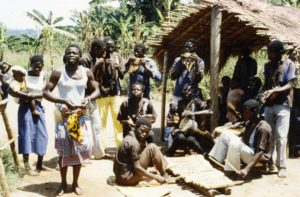
As usual in such songs as this one – Enhonhi kulujo – his budongo leads the way but then is virtually drowned out – even when no xylophone or drums are used. The complete performance lasts 8 minutes – if you want to hear it all along with others recorded in 1990, search BL Sounds with ‘Silaji’ or consult the CD – Ouganda: Ensembles villageois du Busoga/ Uganda: Village Ensembles of Busoga. VDE Gallo AIMP CD 926 (1997).
Texts and translations of other of his songs on the tracks can be downloaded here:- sogaCDtexts
– – – – – – – – – – – – – – –
Acholi district. The lukeme (pl. likeme)
Lying to the north of Lango and adjacent to southern Sudan, this district suffered more than almost any other from the various troubles following the coming to power and later defeat of Idi Amin and later again John Kony.
As in Sudan numerous village groups once flourished. A respected leader Amone Wat Mon was forced to abandon his village near the Sudan border and settled in Kampala, Uganda’s capital. Numerous other internally displaced young Acholi subsequently came to Kampala, many of them sleeping on the streets, while others were forced to resort to begging and petty crime in order to survive. Wat Mon decided to gather together a group of these youngsters and form a group which taught them the artistic skills in music and dance of their own traditional Acholi culture and to display it initially to southerners living around Kampala. From such performance proceeds many youngsters were enabled to pay fees to attend school and college. Equally important was the pride they gained in their own Acholiness.
I made many recordings of Wat Mon’s leading trio of likeme players who were often accompanied by another sounding a flat metal raft rattle.
The second song which I recorded was a sad one about the troubles in Acholi – TooPaco (the death of our homes).
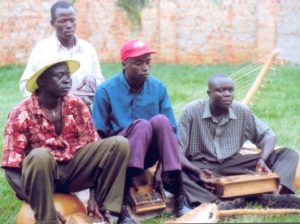
Too Paco
TOO PACO paraphrased:
This is not good and pains our hearts.
Our homes remain deserted, it pains my heart.
The death of our homes pains our hearts.
Acholi children long ago never lived in camps.
Our daughters gave birth in the bush, some came back with
children; our daughters are returning with children.
The death of our homes pains our hearts.
When we hear of the bad things people are doing in the
world it pains our hearts.
When we come back home where do our children study?
We request you, Kenneth Banya, talk with those who are
in the bush to come back home.
Kenneth Banya, come back home and we talk peace.
Otti, come back home…….
Kony, come back home….
– – – – – – – – – – – – – – –
At a concert outside Wat Mon’s Kampala home his okeme team led a group of dancers into the arena where they played for some 30 minutes until it was dark, while the women entered carrying a pot on their heads. They subsequently added more and more until some of them were bearing 6 pots – dancing all the while. The audience of locals and guests appreciated this finale to a varied concert which lasted over three hours.
OLYAK.
When playing for competitions the okeme group often introduced itself with the following song – a kind of boasting song.
OLYAK (entry dance-song) (second version – literal translation)
An-do-yee bulu do An-do-yee, latina jona X 2 .
[Crying out to] young adults yes [Crying out to] child of my close friend.
Anyaka ni leng ci mot cinga deng ba, an wayi lok lobo tye ka bino,
This girl this beautiful…????
Adunu mon bulu lak ki nyinga, jal can balu gitino na,
That girl becoming woman of good shape and young adults are going with my name , friend, poor one who is spoiling my name
(Olak ki nyinga, won-kom nyinge anga, wan wamito neno lwak pa Omon ocora ibar X2) .
Moving around with my name, chairman name what is? We want to seethe group of Omon arrive in the dancing place
Anyaka ma okweri pe ipar bene min boy odong gang adok dong aneno wange,
That young girl who refuses you, don’t mind, mother of my boy, she remains at home. When I return I will see her face
Anyaka ma okweri pe itam bene min boy odong gang adok dong aneno wange
That young girl who refuses you, don’t fear, mother of my boy, she stays at home. When I return I will see her face. …………
Wun ocere ikom Watmon dano ma okwanyo nama, en aye telo wiwa dani ma oloyo
You people, don’t joke, the one who will take number [one] is the one leading us
Wun ocere ikom Awata dong, dano ma oloyo ba, en aye telo wiwa dano ma oloyo.
You people don’t joke, Awata the person who take first place is the one leading us
Bin igam compact ki bota adoko lawer, jal oloyo I Uganda kulu ba
Bin igam compact ki bota adoko lapwony jal Oloyo I Uganda kulu dano ma Oloyo.
You come and get compact [cassette] to me, I am already a teacher, friend, winner over the whole of Uganda, I’m telling you.
Wun owek bura wan wabino me gamo nama
You people, don’t boast, we came here to win first place.
Jal Jokany balo nyinga abala do wun uwek bura wan wabino me gamo nama
My friend, people from Jokany are moving around in my name, we come here to get number [one]
Jal Jokany lak ki nyinga do wun uwek bura wan wabino me gamo nama
My friend, people from Jokany, ?? are moving around in my name. We came here to get number [one]
Jal Jokany ru ki nyinga ba wun uwek bura wan wabino me gamo nama
My friend, people from Jokany, from dawn to dusk are moving around in my name. We came here to get number [one]
Adaa awobe bak mac wan dong wabino do coo wa ki mon, kwany tong wan wabino me game nama
You boys, make a big choir, we are ready here coming ?? Many men and women get spear, we came here to get number [one]
Awobe kunyango Watmon ka dok ocoro, coo wa ki mon kwany tong wacitu ka gamo nama
Boys from where the sun rises , Watmon again arrived, men and women go and get spear and let us go to get number [one]
Awobe bak mac wandong wabino do coo wa ki mon kwany tong wacitu ka gamo nama
You boys, make big fire we are ready, men and women get spear and let us go to get number [one]
Awobe kunyango WatMon ka dok ocoro coo wa ki mon kwany o tong wa citu ka gamo nama
Boys from where the sun rises, Watmon again arrived, men and women go and get spear and let us go to get number [one]
—
Ani joo ma giloyo tuku kwaro omyero anen ki wanga kono awaco ni ngo Watmon obino
People who are always winning because of cultural arts have to see completely what I can say, Watmon is there now. X2
An do ari atoo iye omyero anen ki wanga, tin llaco ni ngo Watmon obino.
Until I die I must see completely today, what can I say, Watmon is there now.
Joo ma giloyo pyem myel omyero anen ki wanga tin aloko ni ngo, Wat Mon obino
? competition dancing? — what can I say to you? Watmon is there now.
Omnyero anen ki wanga WatMo obino X 2
????
Wagoyo kalulu weng kakini, anyaka wan wakwedi wabed piny ba
All of us are playing all down [close to the floor between the feet], girl us sit down [request]. – [kacini is a Swahili word].
– – – – – – – – – – – – –

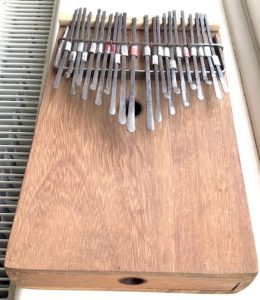 Following the arrival into Uganda of so much Congolese and other popular guitar music styles many musicians began emulating them on lukemes. Extra keys were needed to complete the diatonic scales and to be able to copy the styles of the lead guitars and the range of the instrument was extended by inserting an extra row of short keys and bending their ends upwards so that they could be plucked without disturbing the longer keys.
Following the arrival into Uganda of so much Congolese and other popular guitar music styles many musicians began emulating them on lukemes. Extra keys were needed to complete the diatonic scales and to be able to copy the styles of the lead guitars and the range of the instrument was extended by inserting an extra row of short keys and bending their ends upwards so that they could be plucked without disturbing the longer keys.
No traditions remain unchanged and the same widening of the melodic range of lamellaphones is also occurring in the case of arched harps, often celled ennanga, which are becoming increasingly popular as ensemble instruments throughout much of Uganda and mostly emulate Zairwa and other popular music styles. They are a topic for another blog.
You’re keeping up your excellent and valuable scholarly activities, Peter. Wonderful!
Thanks Dave. There’s still a lot to do to this blog, Dave, adding more and tidying it up. While currently laid low with a damaged spine and pulled chest muscles I can still do this work in my recliner.